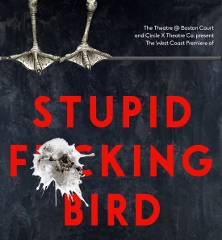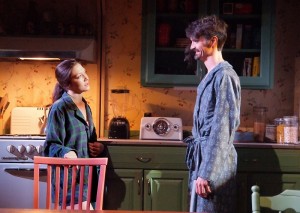GODDAMN CHEKHOV, AGAIN
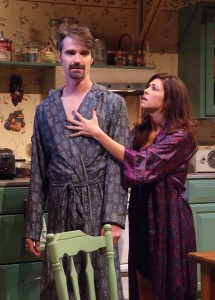 I suspect nobody really likes The Seagull except theater people. It established for the modern age some of the essential playwriting untouchables: a play about actors and writers, and plays, in which the value of art is a major theme? In which not only is acting used as a metaphor for human behavior, but human behavior serves as a metaphor for acting? This can fairly be called myopia in a playwright dating an actress, and Chekhov did not return to this territory though he did marry Olga Knipper. I can tell you that acting school was not made more fun by watching a generation of young actresses attempt Nina’s “I’m a seagull!” monologue, as on-the-nose a speech as has been written – emoting about acting! I don’t even need an as-if! But the Moscow Art Theater and Anton Chekhov found tremendous success with this play, and the narcissism inherent to show people has moved us to learn that lesson rather too well. We think everybody’s secretly fascinated by us. Of Chekhov’s plays it is among the most produced and adapted (including Donald Margulies’ The Country House, which just opened at the Geffen), though far from the most sophisticated or dramatically interesting.
I suspect nobody really likes The Seagull except theater people. It established for the modern age some of the essential playwriting untouchables: a play about actors and writers, and plays, in which the value of art is a major theme? In which not only is acting used as a metaphor for human behavior, but human behavior serves as a metaphor for acting? This can fairly be called myopia in a playwright dating an actress, and Chekhov did not return to this territory though he did marry Olga Knipper. I can tell you that acting school was not made more fun by watching a generation of young actresses attempt Nina’s “I’m a seagull!” monologue, as on-the-nose a speech as has been written – emoting about acting! I don’t even need an as-if! But the Moscow Art Theater and Anton Chekhov found tremendous success with this play, and the narcissism inherent to show people has moved us to learn that lesson rather too well. We think everybody’s secretly fascinated by us. Of Chekhov’s plays it is among the most produced and adapted (including Donald Margulies’ The Country House, which just opened at the Geffen), though far from the most sophisticated or dramatically interesting.
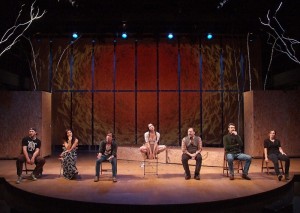 On the plus side, what it does have is a deconstructionist’s paradise of artistic psychology. All the phobias of creative types are here, the demons and fantasias common to the rarefied beings who interpret the dreams of our culture. Fear of failure; fear of incompetence; fear of normalcy. Fear of settling: for the wrong lover; for the wrong career. Fear of intimacy, fear of identity, fear of oblivion: how can they love me when I don’t know who I am? The play was made for postmodern adaptation, and this territory has had no shortage of late explorers, notably Tom Stoppard and Martin Crimp. I’m not sure anyone’s seen a more brash or self-referential version than Aaron Posner’s new Stupid Fucking Bird, late of D.C.’s Woolly Mammoth and currently in residence at Boston Court (in a co-production with Circle X). I’m also pretty sure that this approach is the only one I’d care to see at this point.
On the plus side, what it does have is a deconstructionist’s paradise of artistic psychology. All the phobias of creative types are here, the demons and fantasias common to the rarefied beings who interpret the dreams of our culture. Fear of failure; fear of incompetence; fear of normalcy. Fear of settling: for the wrong lover; for the wrong career. Fear of intimacy, fear of identity, fear of oblivion: how can they love me when I don’t know who I am? The play was made for postmodern adaptation, and this territory has had no shortage of late explorers, notably Tom Stoppard and Martin Crimp. I’m not sure anyone’s seen a more brash or self-referential version than Aaron Posner’s new Stupid Fucking Bird, late of D.C.’s Woolly Mammoth and currently in residence at Boston Court (in a co-production with Circle X). I’m also pretty sure that this approach is the only one I’d care to see at this point.
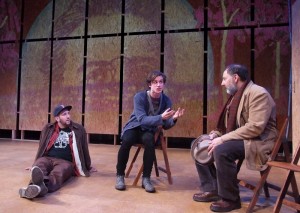 Michael Michetti and a typically great Boston Court ensemble (casting by Julia Flores) nail this sacred cow’s head to the floor and stomp it for three fun, disquieting, un-comforting acts. With all its dangerous trappings – a risky set by the absurdly good Stephanie Kerley Schwartz; ubiquitous video projections by Sean Cawelti; playfully unambiguous costumes by Mallory Kay Nelson; and if-you-thought-the-costumes-were-blatant-you-oughtta-see-the lighting by Elizabeth Harper – it’s still a hefty piece of good old-fashioned serious theater. Michetti likes the overt approach, and it certainly works for this unsubtle adaptation.
Michael Michetti and a typically great Boston Court ensemble (casting by Julia Flores) nail this sacred cow’s head to the floor and stomp it for three fun, disquieting, un-comforting acts. With all its dangerous trappings – a risky set by the absurdly good Stephanie Kerley Schwartz; ubiquitous video projections by Sean Cawelti; playfully unambiguous costumes by Mallory Kay Nelson; and if-you-thought-the-costumes-were-blatant-you-oughtta-see-the lighting by Elizabeth Harper – it’s still a hefty piece of good old-fashioned serious theater. Michetti likes the overt approach, and it certainly works for this unsubtle adaptation.
 And it’s still the essentially Chekhovian comedy of unrequited passion and unfulfilled promise among the retinue of a comically vain actress, here named Emma (Amy Pietz): her pretentious playwright son Conrad (Will Bradley) who longs equally for the love of his mother and of his leading lady Nina (Zarah Mahler), who’s in love with her boyfriend’s mother’s famous writer boyfriend Trigorin (Matthew Floyd Miller); and of Conrad’s friends Dev (Adam Silver) and Mash (Charlotte Gulezian), who is in love with Conrad although she’ll probably marry Dev. As the inevitable Chekhovian doctor, Arye Gross (in a role aggregating a couple of the original characters) putters around his sister’s country house, even more out of place in this version than in more canonical interpretations, and his audience-identification function as bemused outsider is as obvious here as it can be. But it works.
And it’s still the essentially Chekhovian comedy of unrequited passion and unfulfilled promise among the retinue of a comically vain actress, here named Emma (Amy Pietz): her pretentious playwright son Conrad (Will Bradley) who longs equally for the love of his mother and of his leading lady Nina (Zarah Mahler), who’s in love with her boyfriend’s mother’s famous writer boyfriend Trigorin (Matthew Floyd Miller); and of Conrad’s friends Dev (Adam Silver) and Mash (Charlotte Gulezian), who is in love with Conrad although she’ll probably marry Dev. As the inevitable Chekhovian doctor, Arye Gross (in a role aggregating a couple of the original characters) putters around his sister’s country house, even more out of place in this version than in more canonical interpretations, and his audience-identification function as bemused outsider is as obvious here as it can be. But it works.
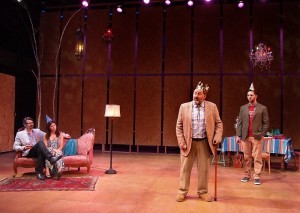 The whole play works, even when it shouldn’t. Posner’s witty, profane dialogue focuses characters in danger of being archetypes, and freshens familiar situations by presenting them without any sense of obligation to the whole Russian historical/cultural/tragical element. Fuck all that, this play says very admirably. Best of all, it’s funny. Chekhov is never funny in this country. This is a thing worth seeing for the single revelation that sad people are really all you’re gonna meet, so you might as well learn to enjoy their pain since, after all, it’s yours too.
The whole play works, even when it shouldn’t. Posner’s witty, profane dialogue focuses characters in danger of being archetypes, and freshens familiar situations by presenting them without any sense of obligation to the whole Russian historical/cultural/tragical element. Fuck all that, this play says very admirably. Best of all, it’s funny. Chekhov is never funny in this country. This is a thing worth seeing for the single revelation that sad people are really all you’re gonna meet, so you might as well learn to enjoy their pain since, after all, it’s yours too.
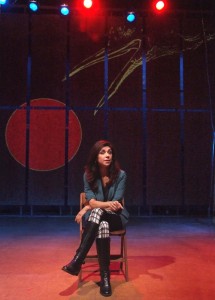 When directing a play that features long, passionate speeches about the degradation of society by bad art, in which actors address the audience directly and engage in squirm-inducing interplay with theatergoers (fine crowd work by Will Bradley, whose straight acting is just as good), in which a play within the play parodies just this kind of theater-oriented theater, in which actors stand naked while proclaiming their truth, in which the play being performed is referenced as such by the players, and which is not so much concluded as summarized by a cast too invested in the goings-on to play out the whole awful story…when directing a play like this, you must trust your writer and go for broke. Michetti’s direction beautifully mashes the discomfort into our faces, helping actors find true moments in the middle of high artifice and orchestrating designers into concert with a fascinating and difficult text. It’s still art about art, no getting around it; and yes, art could use less of that. But if you’re going to do it, this is how to embrace it.
When directing a play that features long, passionate speeches about the degradation of society by bad art, in which actors address the audience directly and engage in squirm-inducing interplay with theatergoers (fine crowd work by Will Bradley, whose straight acting is just as good), in which a play within the play parodies just this kind of theater-oriented theater, in which actors stand naked while proclaiming their truth, in which the play being performed is referenced as such by the players, and which is not so much concluded as summarized by a cast too invested in the goings-on to play out the whole awful story…when directing a play like this, you must trust your writer and go for broke. Michetti’s direction beautifully mashes the discomfort into our faces, helping actors find true moments in the middle of high artifice and orchestrating designers into concert with a fascinating and difficult text. It’s still art about art, no getting around it; and yes, art could use less of that. But if you’re going to do it, this is how to embrace it.
photos by Ed Krieger
Stupid Fucking Bird
Theatre @ Boston Court and Circle X Theatre Company
Boston Court in Pasadena
ends on July 27, 2014
EXTENDED to August 10, 2014
for tickets, call 686.683.6883 or visit Boston Court
